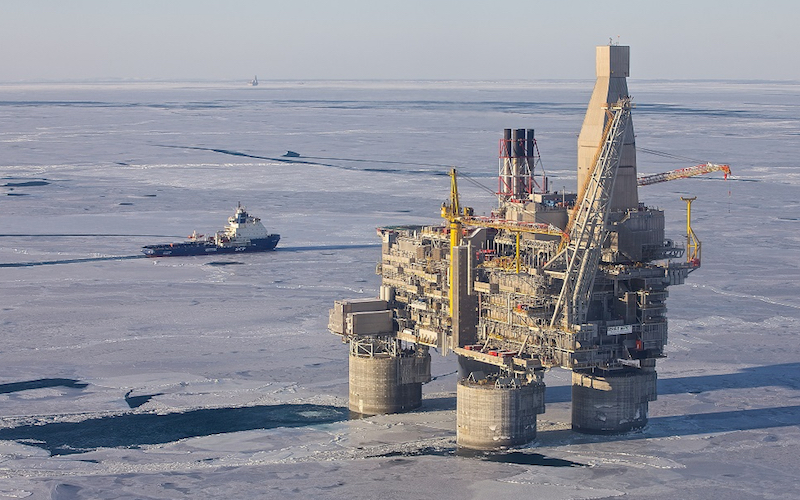
The Melting Arctic: An Opportunity to Cool Down Tensions
The U.S. would be wise to ratify the United Nation Convention on the Law of Sea [UNCLOS], a convention that the U.S. Navy and coast guard already abide by, allowing the United States to utilize the international legal framework to successfully petition its case in the Arctic. In a world growing in tensions between old foes, the Arctic could prove an opportunity to cool down tensions and rebuild trust between the West and Russia.
In December 2014, Denmark submitted its claim to the UN panel in charge of settling the disputes over the demarcation of the Arctic. Denmark claims that the North Pole is connected to its continental shelf through Greenland. Canada and Russia have also made claims about the North Pole.
These latest developments in the Arctic highlight the growing interest in the region as climate change alters the landscape and opens up the Arctic for exploration. The Arctic boasts some of the last untapped energy resources on our planet, with reports estimating the amount of oil in the Arctic seabed in the billions barrel of recoverable oil and trillions of metric cube of gas. Additionally, the seabed of the region is rich in rare-earth mineral, minerals that are crucial for the modern technology sector.
Ignoring the Arctic and the need to invest in it will be a costly mistake for the U.S. and an opportunity missed.
David Titley recently wrote that “If the United States wants to realize its broad national interests in the Arctic, particularly in an era of tense relations with Russia, it must make greater financial commitments and focus its attention on the region.”
The U.S. cannot remain on the sidelines as other countries develop and implement new Arctic policies. Russia, for example, is a world leader in icebreakers, boasting an arsenal of both medium and heavy icebreakers whilst the U.S. trails behind with only a handful of older generation icebreakers. Funding for any new icebreaker program does not appear to be likely anytime soon as indicated by the latest appropriation proposals. The need to invest in the necessary infrastructure for Arctic operations is highlighted clearly in the U.S. Navy’s “The United States Navy Arctic Roadmap for 2014 to 2030.” The Navy views its role in the Arctic as crucial for ensuring search & rescue operations, responding to crisis and preserving freedom of sea and navigation; it is therefore crucial to provide them with the resources necessary to properly operate in the area.
The Arctic is changing quickly. Sea ice and snow levels have shrunk over the past decade. This trend is forecasted to continue throughout the coming century, leading to a more accessible region. However, simply focusing on the Arctic as a potential region for Oil & Gas exploration is to fail to appreciate what the Arctic region represents; an opportunity for regional cooperation between nations whose relationship historically was dominated by disputes and on occasion cooperation when it was deemed necessary.
One of the most pressing issues in the Arctic Ocean will be the delimitation of boundaries, a diplomatically and politically tense topic for Arctic nations.
UNCLOS is the guideline for resolving these disputes. UNCLOS articles highlight the sovereignty of each state over its territory and the rights to explore the resources that lie within those borders and Economic Exclusive Zones.
Arctic nations are facing border disputes due to the intermingling of their EEZs; hence the disputes over who has right over exploration of natural resources, imposing transit fees, among others. The UNCLOS setup mechanism is through the International Court of Justice [ICJ] and allows countries to present scientific evidence in order to back each country’s claims. The ICJ, drawing from a panel of experts review the documents presented and provides recommendations to the parties involved.
The Russian-Norway treaty signed in September of 2010 highlighted a positive example of a peaceful resolution to these disputes.
The general discourse on the Arctic has focused on the risks of military escalation. Though security is a relevant factor when discussing Arctic issues, the region is unlikely to witness military escalation. U.S. Special Representative for the Arctic, Admiral Robert J. Papp, Jr., recent remarks suggest that Russia is not militarizing the Arctic are insightful. Papp noted that the U.S. does not believe Russia is acting unreasonably as the melting Arctic is driving increased maritime traffic in Russia’s waterways.
The Arctic region has tremendous global potential, if not for its resources, but for the environmental and ecological impact of its changing landscape. The nature of the environment in the Arctic favors collaboration rather than competition. The rhetoric may at times appear aggressive in nature, however Arctic nations, including Russia, understand that in order to reap the benefits of the Arctic, cooperation will be crucial. In a global environment marked by instability, conflict and a rise in mistrust, the Arctic region might prove to be a region where trust can be rebuilt and cooperation re-established between global powers.

